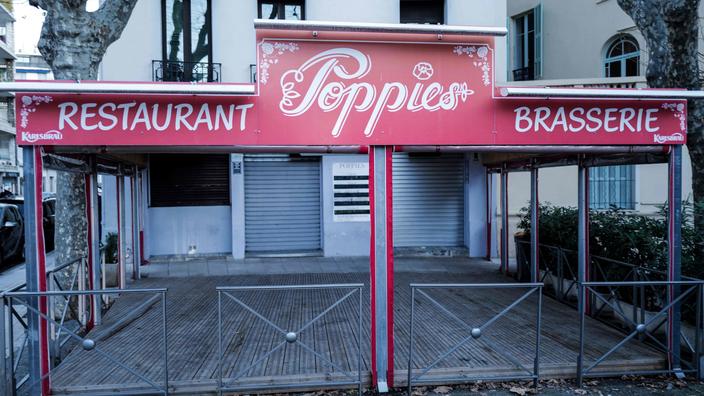It is the story of a man who found himself collateral victim of a scandal that was beyond him.
In Nice, the case of the restaurateur who decided to open his establishment despite the restrictions caused a stir, pushing the police to look into the situation of this restaurant.
One person would have done well without this attention: the cook,
"a foreigner in an irregular situation"
, according to the prefecture of the Alpes-Maritimes, which was placed in detention in the wake, Wednesday.
Read also: In Poland, these restaurateurs who hire their customers to serve them
Without a residence permit, this 34-year-old man of Ivorian nationality had been on French territory for ten years.
He must now leave the country within thirty days, being the subject of an obligation to leave French territory (OQTF) following these events, as confirmed to us by the prefecture of the Alpes-Maritimes.
This is accompanied by a ban on returning to France for two years.
For his part, the manager of the establishment, Christophe Wilson, will be summoned for a "
reminder to the law
", confirms in
Figaro
the public prosecutor of the judicial court of Nice, Xavier Bonhomme.
A decision justified by "
the particular circumstances of the commission of this offense and the statements of the respondent
".
But, he adds, this "
does not in any way prejudge the consequences which could possibly be given subsequently to other offenses which could be noted, in particular from the health point of view
".
An emblematic case of the complexity of the foreign worker file
In this case, the case of the cook of the Poppies is particularly delicate: the man was declared but did not have a residence permit, we learn from the CGT.
He had been on a permanent contract since 2016 in two establishments, he "
was declared to Urssaf, paid contributions and contributed to the
French
solidarity system
", explains Marilyne Poulain, of the Confederal Directorate of the CGT, who is monitoring this file.
“
This is a reality that we are confronted with very regularly: some of the workers without a residence permit are not declared, but this is only a part.
Many are,
”notes the trade unionist.
It is therefore not a priori a question of hidden work.
And the worker in question finds himself in the center of attention, "
while doing his job, has not decided to break the law
", unlike his employer who opened his establishment despite the restrictions.
“
In the end, it's still the worker who finds himself a victim,
” sighs Marilyne Poulain.
The CGT wishes to rely on a circular dated November 2012 addressed to the prefects and signed by the then Minister of the Interior, Manuel Valls.
The latter, applied by a good number of prefectures, specifies the conditions under which foreign workers in an irregular situation can be regularized.
In this case, the cook could benefit from it, given his situation, believes the CGT.
In addition to an appeal before the administrative court, "
the OQTF can be challenged via a graceful appeal before the prefecture, to review the situation, or via a hierarchical appeal before the ministry,
" adds Marilyne Poulain.
The CGT des Alpes-Maritimes therefore “
called on the prefect
” to discuss the case of the worker in question and the application of the circular in the department.
The union is also discussing with the Ministry of the Interior to develop the file.
Highly publicized, will the case of the cook obtain leniency from the prefect or the ministry?
In any case, this is what the union hopes for, which emphasizes the integration through work represented by the present case.
Theoretically heavy penalties
The case of this cook employed without a residence permit is far from being isolated: he finds himself in particular in fields requiring a large and unskilled labor force, for arduous work, in restaurants or hotels, for example. example, according to the CGT.
Yet employers who engage in this kind of practice risk a lot.
In law, “
the irregular employment of foreign workers
” is indeed severely punished.
"
No one may, directly or through an intermediary, hire, retain in his service or employ for any duration whatsoever a foreigner without the title authorizing him to exercise a salaried activity in France
", provides article L8251-1 of the Labor Code.
The employer must verify the statements of his employee and ensure that he is in good standing.
The penalties provided for natural persons employing these foreigners are, in theory, heavy: they can go up to five years in prison and a fine of 15,000 euros per foreigner employed illegally.
The penalty is increased to 10 years' imprisonment and a 100,000 euros fine "
when the offense is committed in an organized gang
", specifies the text.
Legal persons, for their part, risk a fine of 75,000 euros, or five times the penalty of natural persons.
Additional penalties may also apply, including an “
exclusion from public contracts for a period of five years
”.
The employer must also pay a “
special contribution
” per foreign worker, which the “
French Office for Immigration and Integration is responsible for determining and liquidating
”.
Read also: "It's just for friends": dive into the world of illegal restaurants
In addition, the employer may not "
hire or keep in his service a foreigner in a professional category, a profession or a geographical area other than those mentioned, where applicable, on the title authorizing him to exercise an activity. employee in France
”.
As a rule, foreigners who work irregularly are not punished, but they are subject to an OQTF, which can be contested.
This type of situation happens "
on a regular basis
", according to an expert.
Employers, on the other hand, can be sanctioned harsher, but everything will depend on the case, such as the number of foreign workers employed: ten people on a construction site will not lead to the same punishment as one in a small restaurant. , could we summarize schematically.
The declaration or not to the Urssaf also weighs in the balance.
In this case, a reminder of the law for Christophe Wilson is the punishment "
the lightest that there can be
", comments a lawyer.








/cloudfront-eu-central-1.images.arcpublishing.com/prisa/3HRR2JWD2RHM3LA7C5552NJYKM.jpg)
/cloudfront-eu-central-1.images.arcpublishing.com/prisa/5BXUKKEUHRB45CXJXXPGMWBHYM.jpg)